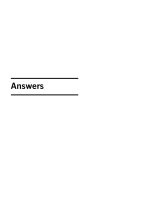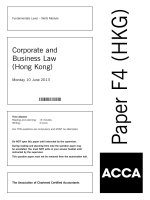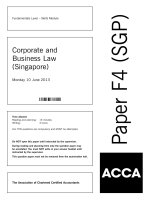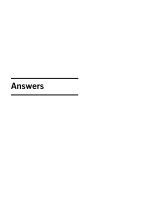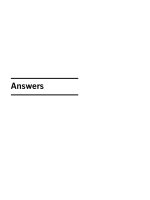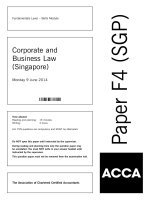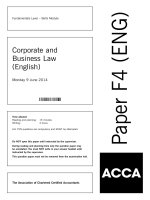ACCA f4 corporate and business law global 2014 jun q
Bạn đang xem bản rút gọn của tài liệu. Xem và tải ngay bản đầy đủ của tài liệu tại đây (77.61 KB, 4 trang )
Corporate and
Business Law
(Global)
Monday 9 June 2014
Time allowed
Reading and planning:
Writing:
15 minutes
3 hours
ALL TEN questions are compulsory and MUST be attempted.
Do NOT open this paper until instructed by the supervisor.
During reading and planning time only the question paper may
be annotated. You must NOT write in your answer booklet until
instructed by the supervisor.
This question paper must not be removed from the examination hall.
The Association of Chartered Certified Accountants
Paper F4 (GLO)
Fundamentals Level – Skills Module
ALL TEN questions are compulsory and MUST be attempted
1
(a) Explain the main differences between criminal law and civil law.
(6 marks)
(b) In relation to a legal system, outline the courts which deal with criminal law and civil law.
(4 marks)
(10 marks)
2
In relation to the UNCITRAL Model Law on International Commercial Arbitration, explain:
(a) the requirement that an arbitration agreement has to be in writing.
(5 marks)
(b) the meaning and significance of statements of claim and statements of defence.
(5 marks)
(10 marks)
3
In the context of the UN Convention on Contracts for the International Sale of Goods, explain:
(a) the ways in which an offer may be accepted;
(6 marks)
(b) when acceptance becomes effective.
(4 marks)
(10 marks)
4
In the context of payment for shares issued by a company, explain the meaning and legal effect of the following:
(a) capital maintenance;
(2 marks)
(b) issuing shares at a premium;
(4 marks)
(c) issuing shares at a discount.
(4 marks)
(10 marks)
5
In the context of partnership law, focusing particularly on the liability of the members, explain each of the
following:
(a) an ordinary partnership;
(2 marks)
(b) a limited partnership;
(3 marks)
(c) a limited liability partnership.
(5 marks)
(10 marks)
2
6
In relation to company law:
(a) explain the meaning of, and procedures involved in, voluntary liquidation; and
(6 marks)
(b) explain and distinguish between:
(i)
a members’ voluntary liquidation;
(2 marks)
(ii) a creditors’ voluntary liquidation.
(2 marks)
(10 marks)
7
In the context of the UN Convention on International Bills of Exchange and International Promissory Notes:
(a) define an international bill of exchange;
(4 marks)
(b) explain the meaning and effect of endorsement.
(6 marks)
(10 marks)
8
In January 2014 Ang, an international metals dealer, entered into a contract to supply Ben, a British manufacturer,
with 100 tonnes of titanium steel to be delivered by 30 June 2014. However, on 1 May, Ben received a telex from
Ang stating that he would not be supplying the steel as he had entered into a more profitable contract to sell it to a
third party.
Required:
Advise Ben as to what action he can take against Ang under the UN Convention on Contracts for the International
Sale of Goods, paying particular attention to the effect of Articles 71 and 72 relating to anticipatory breach of
contract.
(10 marks)
9
Cy is a member of the board of directors of Dix Co, a listed construction company.
He also has a significant shareholding in Fox Co, a company specialising in supplying building material. Last year
Dix Co entered into a contract to buy a large consignment of concrete from Fox Co. Cy attended the board meeting
which approved the contract and voted in favour of it, without revealing any link with Fox Co. The contract price was
substantially above the market price and Fox Co made a considerable profit on the contract.
Required:
In the context of directors’ duties, advise Dix Co whether Cy has breached any of his directors’ duties, and any
action which might be taken against him.
(10 marks)
3
[P.T.O.
10 Gim and Hom formed an online supply company, IMP Co, in 2010 and have been its sole directors since then. The
business has never made a profit and has only managed to carry on trading by using its $50,000 overdraft facility
with Just Bank Co.
In January 2012, IMP Co entered into a large deal and by October 2012 it was obvious that it had lost $100,000
on the contract. Gim and Hom treated the loss as merely unfortunate and carried on trading, although this meant
unilaterally ignoring the limit on their agreed overdraft with Just Bank Co and delaying the payments on their other
outstanding contracts. They justified their decision on the grounds that they could recover all their losses to date from
the profits of a new contract. Unfortunately their optimism was misplaced and the new contract lost an additional
$100,000.
In February 2014 Gim and Hom applied to have IMP Co wound up, owing debts of $250,000.
The realisable value of the company’s assets is $10,000.
Required:
Analyse the above situation from the perspective of Gim and Hom’s potential liability for either fraudulent or
wrongful trading under the UK Insolvency Act 1986.
(10 marks)
End of Question Paper
4

